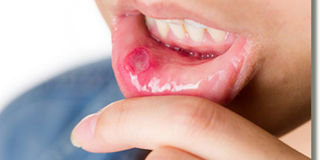Dental clinic: Are mouth ulcers sign of having disease?

Some mouth ulcers are a result of eating or drinking, and medications.
Mouth ulcers can occur anywhere in the mouth including the inside of the cheeks, gums, tongue, lips and the palate, and they are of different types. There are different causes but not all mouth ulcers are as a result of disease.
Canker sore - A canker sore, also known as an aphthous ulcer, is a single pale or yellow ulcer with a red outer ring or a cluster of such ulcers in the mouth, usually on the cheeks, tongue, or inside the lip. It can be painful and usually lasts up to 10 days. These keep recurring but are generally not associated with fever.
Cold sores – Also known as fever blisters, cold sores are fluid filled sores that occur on or around the lips. They are usually painful, usually go up to 10 days and are sometimes associated with cold or flu like symptoms. They rarely form on the gums or the roof of the mouth. Cold sores later crust over with a scab and are usually associated with tingling, tenderness, or burning before the actual sores appear.
Mouth irritation - This irritation can be caused by; biting your cheek, tongue or lip, wearing braces, or having a sharp broken tooth, chewing tobacco, burning one’s mouth with hot food or drinks, having gum disease (gingivitis) or other type of mouth infection, having hypersensitivity to certain things, such as foods or medicines and having certain autoimmune affecting the mucosal lining of the mouth. Others include taking certain drugs such as chemotherapy, antibiotics, medications used for rheumatoid or epilepsy medications and receiving radiation as part of cancer treatment.
Causes
There many causes of oral ulcers and they vary depending on the type of ulcers. Generally, the common causes include reduced immune system because of a cold or flu, hormonal changes or low levels of vitamin B12, certain medications, trauma to the mouth, poor nutrition, stress, bacteria or viruses, lack of sleep, sudden weight loss and certain foods such as potatoes, citrus fruits, coffee, chocolate, cheese and nuts.
Others include biting the inside of the cheek or chewing a sharp piece of food. Canker sores may also result from a genetic predisposition and are considered an autoimmune disease, they are not contagious.
Treatment
This will depend on the cause and the dentist will prescribe what is appropriate depending on the results of the examination.
The writer is a dentist




